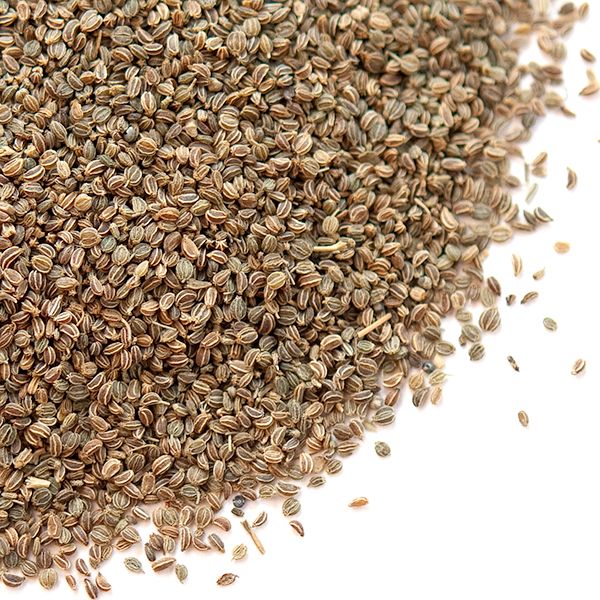Introduction
Celery Seeds: Nature’s Flavor EnhancerCelery seeds, the tiny powerhouses of flavor, are often overlooked in the spice world but pack a surprising punch in both culinary and potential health applications. These small, brown seeds come from the wild celery plant (Apium graveolens), a close relative of the celery we commonly eat.Different Names:Celery seeds are known by various names across cultures:
- Ajmoda (Hindi)
- Ajwain (Urdu)
- Karaf (Arabic)
- Qin cai zi (Chinese)
- Selleriesamen (German)
Celery seeds have been used for centuries in cooking and traditional medicine. Despite their name, these seeds don’t come from the celery stalks we eat but from a different variety of the plant. They offer a concentrated celery flavor without the fibrous texture of celery stalks.Uses:Culinary Applications:
- Pickling and brines: Adds depth to pickled vegetables and sauerkraut
- Salad dressings: Enhances vinaigrettes and creamy dressings
- Spice blends: Key ingredient in celery salt and some curry powders
- Soups and stews: Provides a savory base flavor
- Potato and pasta salads: Adds a distinctive taste
- Bloody Mary cocktails: A classic ingredient for flavor and aroma
Medicinal and Traditional Uses:
- Digestive aid: May help alleviate bloating and indigestion
- Diuretic properties: Traditionally used to support kidney function
- Anti-inflammatory: Potential to reduce inflammation in the body
- Flavoring in herbal teas: Used for its aromatic properties
Benefits:
- Flavor Enhancement: Provides a concentrated celery flavor without bulk
- Convenience: Long shelf life compared to fresh celery
- Nutrient Dense: Contains vitamins K and C, and minerals like manganese and iron
- Potential Antioxidant Properties: May help combat oxidative stress
- Possible Blood Pressure Regulation: Some studies suggest benefits for cardiovascular health
- Versatility: Can be used whole or ground in various dishes
Cons and Side Effects:
While celery seeds are generally safe when consumed in culinary amounts, there are some considerations:
- Allergic Reactions: Those with celery allergies should avoid celery seeds
- Pregnancy Concerns: Large medicinal doses are not recommended during pregnancy
- Drug Interactions: May interact with blood-thinning medications and thyroid drugs
- Diuretic Effect: Excessive consumption may lead to increased urination
- Skin Sensitivity: In rare cases, handling seeds may cause skin irritation
- Overconsumption: Large amounts may cause stomach upset or electrolyte imbalance
Celery seeds offer a unique way to impart the grassy, slightly bitter flavor of celery without the bulk or stringiness of the vegetable itself. They’re particularly useful in recipes where you want the celery flavor but not the texture, such as in smooth soups or delicate salad dressings.In cooking, a little goes a long way. Whole seeds can be used in pickling brines or ground into spice rubs. When ground, they blend seamlessly into sauces, dressings, and marinades. Remember that celery seeds have a more intense flavor than fresh celery, so use them sparingly at first and adjust to taste.For those looking to reduce sodium intake, celery seeds can be an excellent alternative to salt, providing a savory depth to dishes without added sodium. They pair well with other spices like paprika, cumin, and black pepper, making them a versatile addition to your spice rack.While celery seeds have been used in traditional medicine for centuries, it’s important to note that many of their purported health benefits require more scientific research. Always consult with a healthcare professional before using celery seeds for medicinal purposes, especially if you have existing health conditions or are taking medications.In conclusion, celery seeds are a small but mighty spice that can elevate your culinary creations and potentially offer some health benefits. Whether you’re looking to add depth to your pickles, enhance your spice blends, or explore natural remedies, celery seeds are worth considering. Just remember to use them in moderation and be aware of potential side effects or interactions. With their long shelf life and concentrated flavor, celery seeds are a valuable addition to any well-stocked spice cabinet.



